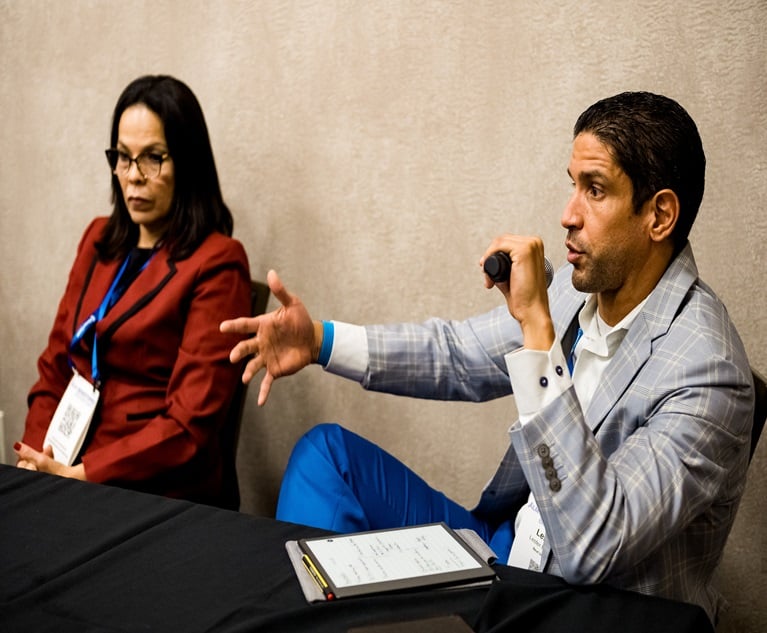I just finished reading yet another article on the state of theeconomy, or as someone recently joked, “the cnmy, since right nowwe can't even afford to buy a vowel.” The article was complete withcharts, graphs, and jargon requiring another article forclarification. So now I'm officially joining the KISAO task force:keep it simple and obvious. Let's face it. Just about everyone thatyou or I know is impacted by cost run-ups and ever-increasingprices at the gas pump and elsewhere.
|It makes sense to me that gas and related travel costs areimpacting an agency's ability to see new clients, produce business,and in general successfully run an operation without losingprofitability. Rich Cooper, president of Mitchell-Noel Insurance inOrmond Beach, said their business model helps them with this issueto some extent. “We've always made it a point to work our localarea extensively, plus we're seeing a lot of our clients andprospects being much more willing to use the internet tocommunicate,” Cooper said.
|Look in Your Own Backyard
|The local community is sometimes overlooked or taken for grantedwhen seeking new business, and I think that applies in just aboutany market condition. Now is certainly a good time to think aboutfocusing or re-focusing on local prospects. That would seem to beobvious, but the Internet and technology has made it very temptingto go after business “out there.”
|I'm not knocking technology, and all of the people I spoke withmade it a point to say they use an efficient management anddelivery system, but not at the expense of customer relationships.We all have to determine how best to balance technology andpersonal relationships, and you should not assume that everyone inyour organization has that balance in mind. They don't, or if theydo then everyone isn't using the same set of scales.
|Also, certain local issues may cause you to avoid seeking newbusiness in your own backyard. If you're avoiding it, then perhapseveryone else is too. That could mean an opportunity. It may not bean easy opportunity, but if it were easy, then everyone would bedoing it.
|Try to look at your local market in a way that's unique. If youhave difficulty doing that, then start talking with people yourespect outside of your own operation. I just set up an advisorygroup for a client/friend, and it was fairly easy, low-cost andfun. It can work for you as well.
|Find Ways to Work Smarter
|When speaking with Dave Jones, agency manager at BB&T –Iler, Wall & Shonter in St. Petersburg, I asked how the economyhas affected staffing in his agency. “Oddly enough,” said Jones,“we're spending more time marketing our renewal business, so we'veactually added to our team.”
|While many in the industry are cutting costs, including staff,it's good to know that some are taking the opposite view. Keepingcosts in check is wise, but now may be a chance to take advantageof your competitor's inability to service his business becausethey're trying to do so with a skeleton staff. Also, from time totime good people are let go by agencies because of falling revenueor mergers, not because they could not do their jobs. They may becandidates you should consider hiring.
|Cooper also mentioned they are providing some compensation toemployees to help offset the rising cost of commuting to work.That's another fairly simple solution to an issue that's impactingjust about everyone, but it's a great idea. Your employees willappreciate the help and will be less likely to seriously seekanother employer a little closer to home.
|Wes Scovanner, CFO of Longwood-based Insurance Office of Americais “not seeing a major change in customer contacts as a result ofgas prices.” He then added, “We're always looking at how we dobusiness, but changes for us are more a result of ongoing review asopposed to the annual budgeting process.” As CFO, he is keenlyaware of increased costs across the board.
|In addition to costs you would think of immediately, Jones alsomentioned making sure that their staff is paying close attention tothe types of products they are quoting and selling, especially withcertain policies. “We are being much more careful with customers,especially new ones, where we may have to agree to 25 percentminimum earned premium on surplus lines and specialty policies.Some folks say to bind coverage and then can't come up with themoney.”
|When in the process of reviewing cost and expense, “eating”premiums via write-downs or write-offs isn't as obvious and isn'talways figured into the mix. However, it's another good idea tomake sure everyone on staff is watching out for policies withsignificant minimum earned premiums or ones that show premiums as“fully earned.” There aren't too many of the latter still around,but all it takes is one to create problems for you.
|Jones also shared the issues that some customers face. “We haveclients trying to renegotiate lease arrangements to reduce costs;some contractors trying to carpool to jobsites; and, on thebenefits side, we're seeing some customers downsizing theirworkforce.” While these steps may be necessary for your customers,you should see this as an opportunity to review their coverage andexposure base to make sure the policy and premium are stillappropriate. If the rating base goes down, then you may give upcommission in the short term, but you will build loyalty andperhaps help keep that business around until things improve.
|Work the Business Plan
|Scovanner also mentioned the impact of increased expenses onagency planning, and is looking at a number of factors. “There area lot of issues that may develop as a result of this year'spresidential election, storm season, the possible rise in interestrates, and so forth. Forecasting for 2009 will again be a greatchallenge for us and others in the industry.”
|That points out the importance of timely planning, i.e., notwaiting until November of 2008 to start planning for 2009. The goalis to be accountable to the plans already in place and to evaluateresults as you continue to modify your plans on a regular basis.I've made the mistake of not working on my business plan frequentlythroughout the year, and would urge you to set aside time at leastonce a quarter to review and modify your plans.
|As to the impact on advertising and marketing, none of the threeagents I spoke with indicated that they had made any drasticchanges, which is good to hear. Unfortunately, many business ownerswill cut their marketing budgets when times are tough, which isfrequently just the opposite of what needs to happen.
|Cooper also offered up another option for gaining business:“We're getting plenty of referrals because so many companies arewithdrawing from our area. We're partnering with some agents andreferring business back and forth, trying to help each other asmuch as possible. That's been very successful, so much so that wereally haven't had to increase our advertising in spite of marketconditions.”
|Cooper's comment is a great example of being in a tough marketand the necessity of reconsidering what we're doing and how we'redoing it. It would be nice if once the calendar flips to next year,many of the difficulties we've faced in 2008 will simply go away.Until that happens (if that happens) we must be determined to winin the market we have in front of us. Sometimes key businessprinciples get lost if too much significance is placed on thecircumstances as opposed to the objectives. In our quest for thenext “new” thing, we are sometimes a little numb to the simple andobvious.
|KISAO, and good luck.
Want to continue reading?
Become a Free PropertyCasualty360 Digital Reader
Your access to unlimited PropertyCasualty360 content isn’t changing.
Once you are an ALM digital member, you’ll receive:
- All PropertyCasualty360.com news coverage, best practices, and in-depth analysis.
- Educational webcasts, resources from industry leaders, and informative newsletters.
- Other award-winning websites including BenefitsPRO.com and ThinkAdvisor.com.
Already have an account? Sign In
© 2024 ALM Global, LLC, All Rights Reserved. Request academic re-use from www.copyright.com. All other uses, submit a request to [email protected]. For more information visit Asset & Logo Licensing.








